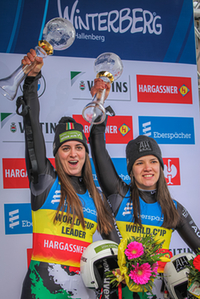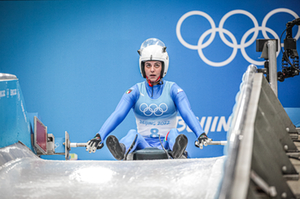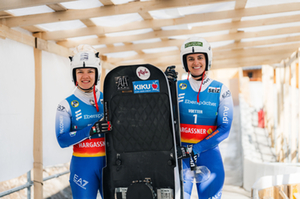Heading for Olympic glory on home turf: the story of luge duo Andrea Vötter and Marion Oberhofer

Cortina (FIL/June 09, 2025) When the Winter Olympics open in Milan-Cortina on February 6, 2026, luge will once again take center stage in Italy – just as it did in Turin in 2006, when Armin Zöggeler won his second gold medal and became a legend. Two decades later, Italian luge athletes could once again make history with the women's doubles team of Andrea Vötter and Marion Oberhofer, who are entering the race as medal hopefuls and could become the next generation of luge icons.
From individuals to a team: the road to success
It is no secret that Andrea Vötter and Marion Oberhofer are a strong team. Since the women's doubles discipline became an official part of the luge calendar, they have played a key role in shaping the sport. They have won two of the three overall titles in the EBERSPAECHER World Cup, as well as the European Championship title in 2023 and the sprint victory at the 2024 World Championships in Altenberg. They are a well-coordinated duo who not only harmonize on the track, but also off it.
“I think the key is our friendship outside the track,” explains Oberhofer. The 24-year-old comes from Meransen in South Tyrol, just a few meters from the Italian start track. “We have great fans and a great team behind us – that makes us strong.”
Andrea Vötter, who raced in the singles for eleven years before switching to the doubles in 2021, adds soberly: “Of course, we know that we are among the favorites for 2026. But we are taking it step by step. First comes the test race in Cortina in November, then the World Cups and the Olympic qualifiers.”

Between triumph and challenge
Despite all their successes, there is still one gap in their record: the World Championship title. In Oberhof in 2023, they were close, finishing just 0.187 seconds behind, but gold went to the German duo Degenhardt/Rosenthal. In 2024 in Altenberg, they missed out on the podium again, as they did at the 2025 World Championships in Whistler, where they finished in an unfortunate fourth place.
The competition is not resting on its laurels – teams from Germany, Austria, Latvia, and the USA are engaged in a close battle for hundredths of a second. But the duo from South Tyrol is analyzing meticulously and working hard. “Our biggest weakness recently has been the start,” says Oberhofer. On the flat track in Cortina, this will be decisive. “We need a good start time there to maintain speed throughout the entire track.”

The Olympic dream on Italian ice
The 2026 Olympic Games in their home country are more than just a sporting goal. They are motivation, emotion, and perhaps the crowning glory of an extraordinary journey together so far. While Vötter is the more experienced athlete at 29, Oberhofer brings youthful dynamism to the team – a combination that works.
“We are really looking forward to the Olympic Games in our home country,” said Vötter. “But we also know that we still have a lot of work ahead of us. The new Olympic track is not the most technically difficult track, but it is difficult to achieve a fast time.”
The two-time overall World Cup winner in the women's doubles is looking forward to the challenge: “Cortina has become my favorite track. I really like it. We had some very good training runs in April 2025 with excellent conditions for that time of year. Of course, a flat start would be better for us, but fortunately there is no difficult start corner. The most important thing is definitely a fast start to carry the momentum through to curves 8-9. We need to demonstrate optimal aerodynamic position and need a fast sled.”

What happens in Cortina will not only be groundbreaking for Vötter and Oberhofer, but for the entire discipline: the women's doubles will be making their Olympic debut there. Whoever wins there will be immortalized in the history books of luge – just like Feistmantl and Stengl did in 1964 in the men's doubles at the first Olympic Games in Innsbruck.
With one foot on the podium?
The road to a medal in Cortina is still long and full of uncertainties. But Vötter and Oberhofer have developed into world-class athletes in three years and know what it takes. Technique, tactics, timing – and a strong team behind them. Maybe they will be standing on the top step of the podium in 2026. Maybe not. But they are already pioneers in their discipline – and sporting ambassadors for Italy.
And who knows: maybe they will write a new chapter in Italian luge history in Cortina.









